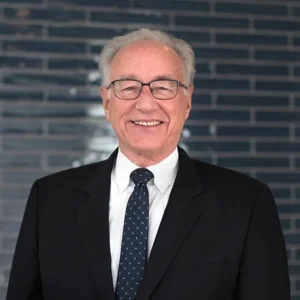 Last year, our own William J. Britt was honored by the Greater Bridgeport Bar Association (GBBA) at its annual meeting in recognition of his 50-year legal practice and GBBA membership. Several BW attorneys were on hand that evening to celebrate Bill’s achievements. Given the significance of the occasion and his many contributions to the firm, we asked Bill to share his thoughts on the past 50 years.
Last year, our own William J. Britt was honored by the Greater Bridgeport Bar Association (GBBA) at its annual meeting in recognition of his 50-year legal practice and GBBA membership. Several BW attorneys were on hand that evening to celebrate Bill’s achievements. Given the significance of the occasion and his many contributions to the firm, we asked Bill to share his thoughts on the past 50 years.
Q: What motivated you to pursue a career in law and how has that motivation evolved over the years?
A: When I graduated college in 1970, the Vietnam war was still going on and unfortunately I had a low lottery number. The only way to continue my education and not be drafted was to attend a graduate school which offered an advanced ROTC program. I felt that if I had to go to Vietnam it was better to go as an officer. I also hoped that the war would be over by the time I graduated. I was always interested in business so my choices were a law degree, an MBA or a master’s in economics. I decided to pursue a law degree not to practice law but to gain more skills in the business world.
I attended The Catholic University of America Law School in Washington, DC, which did not offer ROTC. However, nearby Howard University did. In 1972, I received a degree in military science from Howard and a commission in the United States Army. I was able to defer my military service one more year so I could finish law school. While participating in the DC Law Students in Court program, my motivation to practice law took on another dimension. Through an experience of representing an underprivileged person in a local eviction matter, I quickly learned that there was much more to the law than understanding business. I liked representing people who needed help. It was and continues to be personally fulfilling.
Q: How has the legal landscape evolved during your career and how have you adapted to these changes?
A: The legal landscape is a lot more complicated today than it was 50 years ago. The number of laws that have been enacted since I began practicing have multiplied exponentially. There is a constant need to keep up with new legislation through continuing legal education.
Technology revolutionized how we research issues, draft documents, and communicate with clients. What we gained in efficiency, we lost in other measures of time. Technology has fostered a culture with a built-in expectation for instantaneous answers. It has also created its own set of challenges such as data privacy and security threats which we did not have to worry about when I first started practicing. Safeguarding client information has become a critical operational responsibility to manage, daily.
Q: Can you discuss a particularly challenging matter or legal issue you encountered and how you navigated through it?
A: Three years into practice, I argued a case before the Connecticut Supreme Court that tested my knowledge of trusts. The case involved a 16th century English law referred to as “The Rule Against Perpetuities.” The Rule prevented people from creating trusts which lasted for too long a period of time. If a trust violated the Rule, the trust was void. When I got the case, Connecticut followed the English Rule which stated that for a trust to be valid, it must end not later than 21 years after the death of a beneficiary living at the time the trust was created. Today, Connecticut’s Rule allows trusts to last for up to 800 years. In my case, I was able to convince the Court that the trust in question which held over $2M in securities not only violated the Rule but also should be struck down immediately. The Court agreed and ordered that our client (an estate of one of the decedent’s children) receive one-third of the money and distant relatives, including strangers, receive the balance. Back then, there was no technology to help me do the research. I did it the old-fashioned way — at the law library. What makes this matter stand out most for me is the fact that very few lawyers have the opportunity to work on a Rule against Perpetuities case, yet I got one in the early days of my career and I was fortunate enough to win it.
Q: How have your relationships with clients evolved and what role has trust played in your long and successful practice?
A: Most of my client relationships are multi-faceted and rooted in trust and estate planning. I represent the personal and business affairs of generational families. The relationships evolve from planning for their children and their business ventures to planning for future generations. Trust and estate planning is the glue that holds the relationships together and provides for continuity. Clients become friends and unfortunately, I’ve said goodbye to many over the years. Given the cycle of life, my role of planning and protecting families evolved into settling estates, administering trusts and executing business succession plans for the benefit of second and third generations. I’m there at the start and I’m there at the end when my value is felt most by clients.
Q: Can you share a memorable milestone or highlight that stands out in your career?
A: Over the years, there have been three cases that validated why I became a lawyer. The circumstances of each case were unique but they share one thing in common. The clients were underdogs about to be victimized by the government; a pompous and overbearing trustee; and a prejudicial executor who tried to take advantage of an immigrant heir. Each case allowed me to apply my skills to help them in ways that changed their lives for the better. Over the last 50 years the law may have changed but my mission remains constant and that is to be of service to others.
Q: Reflecting on your experiences, what advice would you give to aspiring lawyers starting their careers today?
A: A few pearls of wisdom come to mind. The first, expressed to me when I was a young aspiring lawyer by our former co-founder Seth Brody, is blunt but truthful. If money is what motivates you, this is not the right career choice. There is a lot more to practicing law than earning money. For those seeking a career in private practice, I would also emphasize the importance of working at a firm where you can collaborate with and benefit from other lawyers versus pursuing a solo endeavor. Everyone needs a sounding board. Lastly, I would stress the point to never accept anything at face value. Be sure to do your due diligence. Dig deep into whatever issues and complexities are at stake to understand a matter thoroughly so you can explain it to clients and know how to proceed with the utmost confidence.


